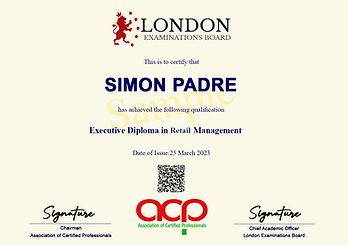PROGRAMME AIMS
This Executive Diploma in Retail Management is designed to gain key knowledge relating to the concepts and types of retailing businesses within the retail industry. Be able to apply retail models, tools, and principles to ensure effective retail operations and manage products. It is designed to equip those who are keen to take up employment in Management within the business sector. Those who are keen to further their education can progress on to either the Higher Diploma in Business Management or gain entry and acceptance into Year 2 of a Bachelor’s degree.
PROGRAMME STRUCTURE
The Executive Diploma in Retail Management comprises of three modules. The Executive Diploma in Retail Management is a professional diploma delivered in a manner that gives you the flexibility to learn at a time and place that suits your personal and work life. You can embark immediately on an Executive Diploma in Retail Management knowing you can fit it into your schedule.
3 core modules 60 credits
- Introduction to Retail Management – 20 Credits
- Retail Management – 20 Credits
- Product Management – 20 Credits
DELIVERY MODE
Mode A: Blended Learning mode
Available at selected Approved Learning Centres where classes are held plus learners are given a complete set of learning materials to facilitate independent study which can be accessed through our designated Learning Portal.
For each module we recommend that Approved Learning Centres provide between 6 and 12 hours of lectures/tutorials and that you spend at least 12 hours learning online.
Mode B: Fully Online mode
Learners are given a complete set of learning materials to facilitate independent study which can be accessed through our designated Learning Portal. For each module, we recommend at least 24 hours of online learning.
ADMISSION CRITERIA
An applicant may be admitted on the basis of evidence to suggest that he or she will be able to fulfill and benefit from the objectives of the programme and achieve the standard required for the award.
Summary of Entry Requirements
No prior knowledge is required. Applicants should normally be at least 16 years old and preferably with the following:
- Level 3 (QCF/RQF) Certificate;
- 4 GCSEs at grade C or above; or
- Working adults.
Advanced Standing / Exemptions / Credits Transfer (APL)
Consideration for the above for learners admitted onto the programme may be considered either at the beginning of a programme, or beyond the beginning of a programme, through an assessment of that learner’s prior learning, whether certificated or un-certificated. The process for making such a decision is known as the Accreditation of Prior Learning (APL) is a matter of academic judgment exercised by the appointed panel considering applications and approvals of APL. Where cohorts of learners are to be admitted with advanced standing on a regular basis, the arrangement should be subject to an Academic Progression Agreement.
ASSESSMENT STRUCTURE
Comprehensive Multiple Choice Questions (“MCQs”)
The mode of assessment is a carefully designed MCQs consisting of 50 MCQs to be taken either online or in a proctored paper-based final examination at approved centres. The duration of this final assessment will be 1.5 hours. The MCQ will serve to validate the attainment of broad understanding and application of knowledge by learners is related to the intended learning outcomes.
UNIT SPECIFICATION
Participants will be awarded an Executive Diploma in Retailing Management upon completion of the 3 Modules in Introduction to Retail Management, Product Management, and Retail Management.
1. Introduction to Retail Management
Learning Outcomes
On completion of this Module learners will be able to:
- Articulate key knowledge relating to the retailing industry and operational activities.
- Use the required models, tools, and practices to ensure effective Retail Operations.
Topics covered include:
- The retail industry
- Retail organizations
- Economics of retailing
- The retailing environments
- Consumer buying behaviour
- Segmentation
- Store location
- Product decisions
- Buying
- Stock management
- Pricing
- Advertising
- Personal selling
2. Retail Management
Learning Outcomes
On completion of this Module learners will be able to:
- Examine key knowledge relating to the concepts and types of retailing businesses in the retailing industry.
- Use the required models, tools, and principles to ensure effective Retailing Management.
Topics covered include:
- What is Retail Management?
- The Benefits of Retailing
- The Retail Selling Process
- Components of the Retailing Concept
- Steps of Retail Strategy Planning
- What is franchising?
- What is merchandising?
- What is Visual Merchandising?
- The Importance of Location in Retailing
- Types of Retail Locations
- What is a Private Label?
- Process of Creation of Private Label
- Tips for Success in Retailing
3. Product Management
Learning Outcomes
On completion of this Module learners will be able to:
- Examine the various key concepts and principles relating to product management.
- Apply various techniques and tools used in conceptualizing, commercializing, and launching new products including managing product life cycle.
Topics covered include:
- Overview and opportunity
- New product successes and failures
- New product development process
- Concept generation and testing
- Test marketing
- Product launch and commercialization
- Product life cycle
- Pitfalls of Balanced Scorecard

